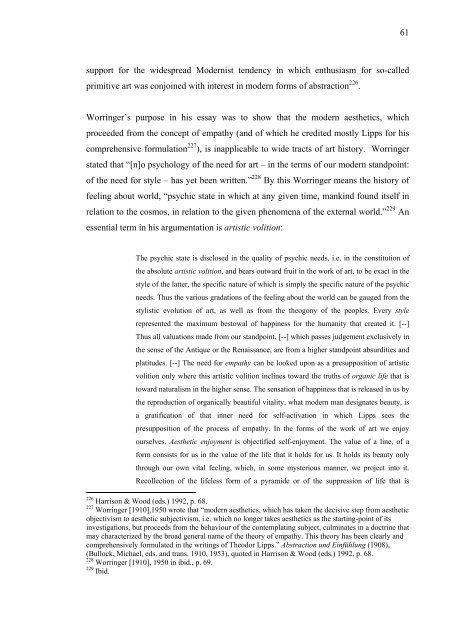Boris Asaf'ev and the Soviet Musicology - E-thesis
Boris Asaf'ev and the Soviet Musicology - E-thesis
Boris Asaf'ev and the Soviet Musicology - E-thesis
Create successful ePaper yourself
Turn your PDF publications into a flip-book with our unique Google optimized e-Paper software.
support for <strong>the</strong> widespread Modernist tendency in which enthusiasm for so-called<br />
primitive art was conjoined with interest in modern forms of abstraction 226 .<br />
Worringer’s purpose in his essay was to show that <strong>the</strong> modern aes<strong>the</strong>tics, which<br />
proceeded from <strong>the</strong> concept of empathy (<strong>and</strong> of which he credited mostly Lipps for his<br />
comprehensive formulation 227 ), is inapplicable to wide tracts of art history. Worringer<br />
stated that “[n]o psychology of <strong>the</strong> need for art – in <strong>the</strong> terms of our modern st<strong>and</strong>point:<br />
of <strong>the</strong> need for style – has yet been written.” 228 By this Worringer means <strong>the</strong> history of<br />
feeling about world, “psychic state in which at any given time, mankind found itself in<br />
relation to <strong>the</strong> cosmos, in relation to <strong>the</strong> given phenomena of <strong>the</strong> external world.” 229 An<br />
essential term in his argumentation is artistic volition:<br />
The psychic state is disclosed in <strong>the</strong> quality of psychic needs, i.e. in <strong>the</strong> constitution of<br />
<strong>the</strong> absolute artistic volition, <strong>and</strong> bears outward fruit in <strong>the</strong> work of art, to be exact in <strong>the</strong><br />
style of <strong>the</strong> latter, <strong>the</strong> specific nature of which is simply <strong>the</strong> specific nature of <strong>the</strong> psychic<br />
needs. Thus <strong>the</strong> various gradations of <strong>the</strong> feeling about <strong>the</strong> world can be gauged from <strong>the</strong><br />
stylistic evolution of art, as well as from <strong>the</strong> <strong>the</strong>ogony of <strong>the</strong> peoples. Every style<br />
represented <strong>the</strong> maximum bestowal of happiness for <strong>the</strong> humanity that created it. [--]<br />
Thus all valuations made from our st<strong>and</strong>point, [--] which passes judgement exclusively in<br />
<strong>the</strong> sense of <strong>the</strong> Antique or <strong>the</strong> Renaissance, are from a higher st<strong>and</strong>point absurdities <strong>and</strong><br />
platitudes. [--] The need for empathy can be looked upon as a presupposition of artistic<br />
volition only where this artistic volition inclines toward <strong>the</strong> truths of organic life that is<br />
toward naturalism in <strong>the</strong> higher sense. The sensation of happiness that is released in us by<br />
<strong>the</strong> reproduction of organically beautiful vitality, what modern man designates beauty, is<br />
a gratification of that inner need for self-activation in which Lipps sees <strong>the</strong><br />
presupposition of <strong>the</strong> process of empathy. In <strong>the</strong> forms of <strong>the</strong> work of art we enjoy<br />
ourselves. Aes<strong>the</strong>tic enjoyment is objectified self-enjoyment. The value of a line, of a<br />
form consists for us in <strong>the</strong> value of <strong>the</strong> life that it holds for us. It holds its beauty only<br />
through our own vital feeling, which, in some mysterious manner, we project into it.<br />
Recollection of <strong>the</strong> lifeless form of a pyramide or of <strong>the</strong> suppression of life that is<br />
226 Harrison & Wood (eds.) 1992, p. 68.<br />
227 Worringer [1910],1950 wrote that “modern aes<strong>the</strong>tics, which has taken <strong>the</strong> decisive step from aes<strong>the</strong>tic<br />
objectivism to aes<strong>the</strong>tic subjectivism, i.e. which no longer takes aes<strong>the</strong>tics as <strong>the</strong> starting-point of its<br />
investigations, but proceeds from <strong>the</strong> behaviour of <strong>the</strong> contemplating subject, culminates in a doctrine that<br />
may characterized by <strong>the</strong> broad general name of <strong>the</strong> <strong>the</strong>ory of empathy. This <strong>the</strong>ory has been clearly <strong>and</strong><br />
comprehensively formulated in <strong>the</strong> writings of Theodor Lipps.” Abstraction und Einfühlung (1908),<br />
(Bullock, Michael, eds. <strong>and</strong> trans. 1910, 1953), quoted in Harrison & Wood (eds.) 1992, p. 68.<br />
228 Worringer [1910], 1950 in ibid., p. 69.<br />
229 Ibid.<br />
61

















